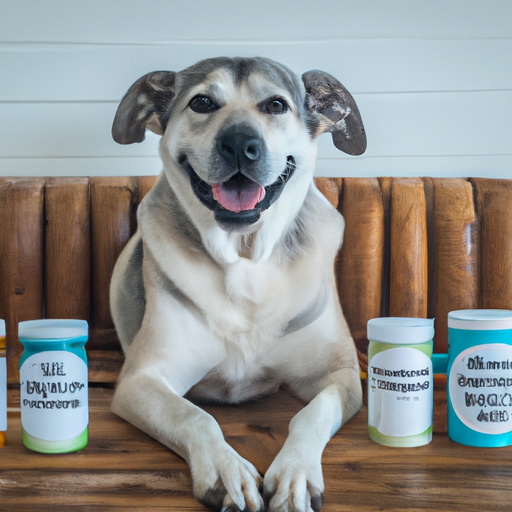As a caregiver for your furry friend, you’re always seeking ways to enhance their health and well-being. One potent tool that has been gaining traction in dog health circles is probiotics. These are live bacteria and yeasts that are beneficial for health, particularly the digestive system. But what are the best probiotics for dogs? Let’s dive deep into the world of canine probiotics to find out.
What are Probiotics and Why are they Important?
Probiotics are a type of ‘good’ bacteria that help restore the natural balance of bacteria in your pet’s gut. They can aid in digestion, boost immunity, and promote overall health. They’re particularly beneficial for dogs suffering from digestive disorders, allergies, or those who’ve been on long-term antibiotics.
Top 5 Probiotics for Dogs
There are numerous probiotics available on the market, but not all are created equal. Here are the top five probiotics that are beneficial for dogs:
-
Purina Pro Plan Veterinary Diets FortiFlora Probiotic Supplement: Backed by scientific research, this supplement contains a high concentration of probiotic microorganisms to promote a healthy intestinal environment.
-
Nutramax Proviable Health Dogs Capsules: These capsules contain multiple strains of probiotics along with prebiotics to enhance their effectiveness.
-
Zesty Paws Probiotic Bites: These soft chewable bites are convenient and contain six strains of probiotics for maximum benefit.
-
VetriScience Laboratories – Probiotic Everyday for Dogs: This probiotic supplement is great for everyday use and contains prebiotics for added digestive support.
-
Nusentia Probiotic Miracle Dog Probiotics: This powder supplement is easy to administer and contains six beneficial probiotic strains.
| Probiotic | Strains | Form |
|---|---|---|
| Purina Pro Plan FortiFlora | Single strain | Powder |
| Nutramax Proviable | Multiple strains | Capsules |
| Zesty Paws Probiotic Bites | Six strains | Chewable Bites |
| VetriScience Laboratories | Single strain | Capsules |
| Nusentia Probiotic Miracle | Six strains | Powder |
How to Choose the Right Probiotic for Your Dog
When selecting a probiotic for your dog, look out for the following factors to ensure you’re making the best choice:
- Number of strains: A probiotic with multiple strains is often more effective than a single-strain probiotic.
- CFU count: CFU stands for colony-forming units, which indicates the number of live and active microorganisms in the probiotic. A higher CFU count is typically better.
- Other ingredients: Look for probiotics that contain prebiotics, as they fuel the probiotics and enhance their effectiveness.
- Ease of administration: Consider your dog’s preferences — some might prefer chewable bites while others might be more amenable to powder or capsules.
The Role of Diet in Your Dog’s Gut Health
While probiotics can greatly enhance your dog’s gut health, remember that diet plays a crucial role too. A diet rich in fiber can help feed the good bacteria in your dog’s gut. Try incorporating foods like sweet potatoes, pumpkin, and peas into their diet.
Side Effects and Risks
While probiotics are generally safe for dogs, they can cause mild side effects like gas and bloating. In rare cases, they can lead to serious infections in dogs with weakened immune systems. Always consult a vet before starting your dog on a probiotic regimen.
Frequently Asked Questions
1. Can I give my dog human probiotics?
While it’s not harmful to give your dog human probiotics, they may not be as effective. Canine-specific probiotics are tailored to the unique gut environment of dogs and are usually a better choice.
2. How often should I give my dog probiotics?
This depends on the specific probiotic and your dog’s condition. Some dogs may benefit from daily probiotics, while others might only need them during periods of stress or illness. Always follow the dosage instructions on the probiotic package.
3. Can puppies have probiotics?
Probiotics can be beneficial for puppies, especially those with digestive issues. However, it’s best to consult with a vet before starting a puppy on probiotics.
4. What are the signs my dog needs probiotics?
Signs your dog might benefit from probiotics include frequent diarrhea, flatulence, bloating, and changes in appetite or weight. If your dog shows these signs, a vet visit is in order to rule out more serious conditions.
5. Can probiotics help my dog’s bad breath?
Probiotics can help improve your dog’s dental health by balancing the bacteria in their mouth, which can potentially improve bad breath.
To conclude, probiotics offer numerous health benefits for dogs. Choosing the right probiotic for your pet can be a game-changer in their overall health and well-being. As always, it’s best to consult with a vet before starting any new supplement regimen.



